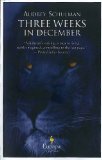Summary | Excerpt | Reviews | Beyond the Book | Readalikes | Genres & Themes | Author Bio

HISTORICAL NOTE
In the late 1890s, by the River Tsavo, in the country now called Kenya, two lions began to kill and eat people. Working in concert, they preyed on Africans, Indian railroad workers, and British administrators. Dozens of men hunted the cats. Extensive barricades were built up around all human habitation. Still, every few nights, the lions would somehow appear by the firelight inside a camp or village. They seemed bigger than any lions previously recorded, and stronger. They would drag someone away. In the darkness the screams of the victim were suddenly cut off. They ate over a hundred people.
THE STEAMSHIP GOLIATH,
EAST INDIAN OCEAN
DECEMBER 7, 1899
ONE
Three hundred miles from Mombasa, the steamship
Goliath happened upon an Arabian dhow becalmed on
the Indian Sea. The sail hung slack, the rope trailing
loose, and no person was visible aboard. The steamer rumbled
deep in its guts to begin its emergency halt.
Carrying his iced tea, Jeremy got up from his lounge chair
to walk to the railing where he could view the boat better. Even
at eight in the morning, he narrowed his eyes as he stepped
into the weight of the tropical sun.
As the shadow of the steamer crept over the tiny wooden
boat, its single sail slapped listlessly from side to side. Peering
down, it took Jeremy a moment to make out the sprawled
forms of the five Mohammedans, their white robes appearing
at first like discarded sailcloth. Only their faces showed, burned
so dark they appeared black. Although none of them were able
to sit up, two of them beckoned weakly as they stared up at
their rescuers. A crew member from the steamer unrolled a rope
ladder down the side of the ship and then clambered down, balancing
a cask of water on his shoulder. For the next few minutes,
the five men took turns drinking. One of them cupped his
fingers over his mouth after each turn as though to ensure no
water trickled back out. Jeremy could see them talking, but
could not hear, over the steamer's rumbling engines, what language
they used. The white man listened attentively, asked a
few questions and then clambered back up the ladder to head
toward the bridge. Jeremy watched him in the cabin there,
reporting to the captain. The captain's face was obscured by a
harsh streak of sun on the window, leaving only his white uniform
facing Mombasa, their destination. At no point did the
captain turn toward the stranded men.
After what seemed a long wait, the crew member reappeared
at the head of the ladder. He did not climb down this time, but
just lowered another cask of water on a rope, yelled some last
words down to the Mohammedans, pointed emphatically twice
in a westerly direction, and then rolled up the ladder. The engines
surged and the ship chugged away.
Surprised, Jeremy watched the dhow bump off the steamer's
side and twist in its wake.
He stopped a crewmember walking by. "Where are they
trying to get to?"
"Get to?" asked the purser. "Those poor buggers? Dar es
Salaam, sir. They ran out of water two days ago. They're lucky
we stumbled onto them."
"Will they be all right?"
"What, them?"
Here, he would be working for the British: a detail about
his employment he rather regretted. They frequently repeated
questions as though shocked at the rest of the world's lack of
basic comprehension. Already, he had met several men who
each spoke with as much stiff-necked propriety as though the
papers to the whole of the ever-expanding British Empire were
secreted about his clothing. The titles to the Suez Canal and
Canada stuck down his collar; Uganda and Nigeria tucked into
his socks; Singapore and Australia snug along his thighs; India
supporting the small of his back; British East Africa, Rhodesia,
and all the rest in the armpits. No matter what exotic sights
passed by, no matter who tried to interact with him, the man's
expression stayed internal as he struggled not to perspire on
the paperwork.
Excerpted from Three Weeks in December by Audrey Schulman. Copyright © 2012 by Audrey Schulman. Excerpted by permission of Europa Editions. All rights reserved. No part of this excerpt may be reproduced or reprinted without permission in writing from the publisher.
Your guide toexceptional books
BookBrowse seeks out and recommends the best in contemporary fiction and nonfiction—books that not only engage and entertain but also deepen our understanding of ourselves and the world around us.